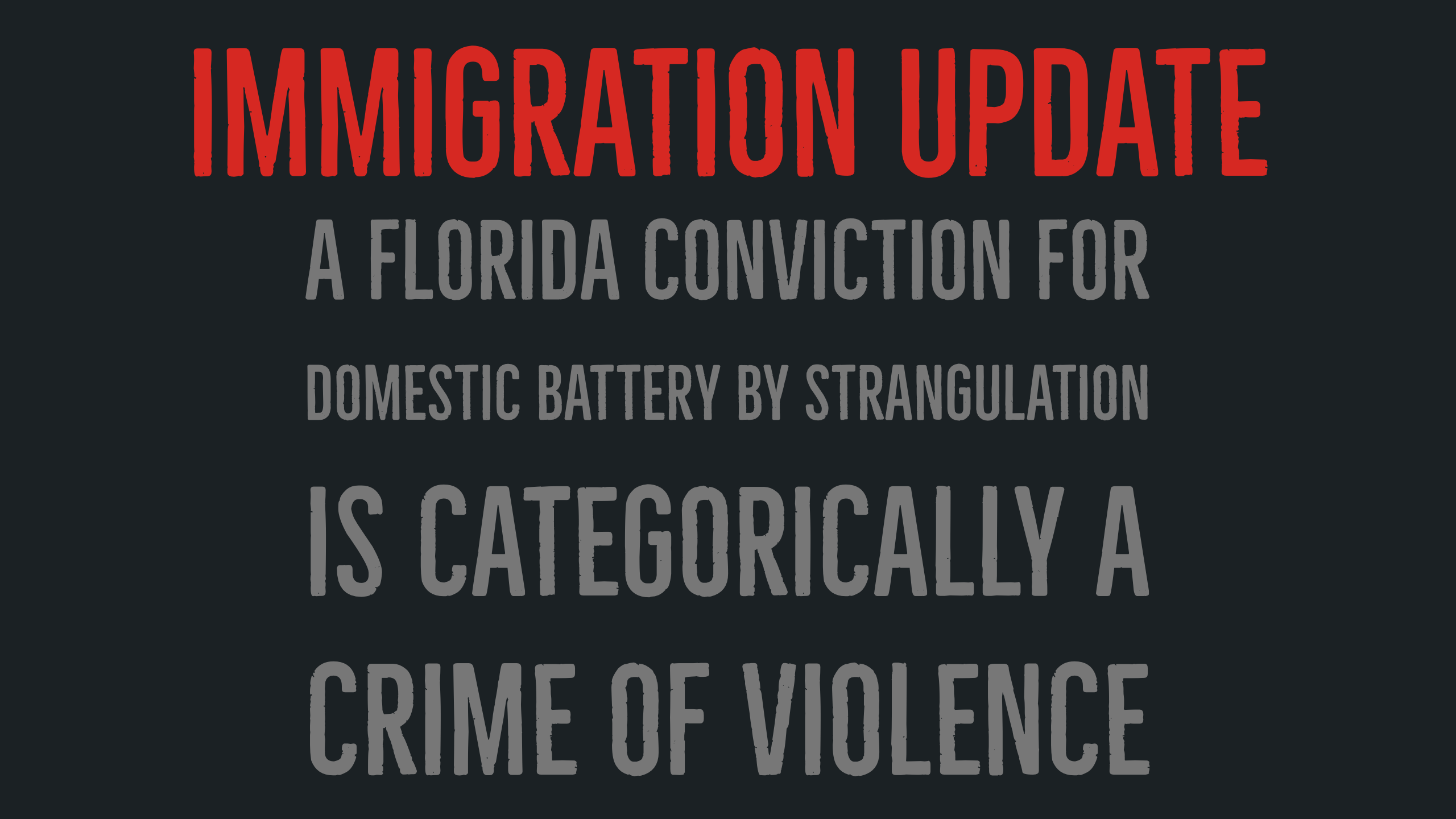
The Eleventh Circuit Court of Appeals has recently ruled that a conviction for Domestic Battery by Strangulation is categorically a crime of violence. This means that any non-U.S. citizen who is sentenced to 1 year or more on a Florida Domestic Battery by Strangulation would be convicted of an “Aggravated Felony” for immigration purposes and would almost certainly be subject to mandatory deportation. You can read the full decision here: United States v. Shawn Dixon, No. 17-10503
What is a Crime of Violence?
There are certain criminal convictions that are deadly to any non-U.S. citizen. “Aggravated felonies” will lead to almost certain mandatory deportation in most cases. A conviction for an aggravated felony is to be avoided at all costs. Aggravated felonies are defined in the Immigration and Nationality Act in §101(a)(43). One particular type of aggravated felony is a crime of violence where you have been sentenced to incarceration for 1 year or more. (INA §101(a)(43)(F)). If you are incarcerated for 1 day less than 1 year for a crime of violence, it would not be an aggravated felony. It still could crime involving moral turpitude or some other deportable offense, but it would not be an aggravated felony.
So, what is a “crime of violence?” There is no list of Florida statutes that qualify as “crimes of violence.” Rather, the Board of Immigration Appeals, Federal Circuit Courts, and U.S. Supreme Court must interpret whether a conviction under a specific state statute was intended to be considered a “crime of violence,” when the legislature passed the law. So, we must look to case law to either tell us that a conviction under a specific statute is a “crime of violence” or if the appellate courts have not address the specific statute, we must read the tea leaves in opinions rendered discussing similar statutes.
A “crime of violence” includes a crime “that has as an element the use, attempted use, or threatened use of physical force against the person or property of another.”
Why Is A Florida Domestic Battery By Strangulation Considered A Crime Of Violence?
You may be surprised to learn that a conviction in Florida for a Domestic Battery is categorically not a crime of violence. This is because the Supreme Court held in Curtis Johnson v. United States, 559 U.S. 133 (2010), that a person can be convicted of Domestic Battery for merely intentional contact, no matter how slight. No injury is required. No amount of force. Any intentional touching could be sufficient for a conviction for domestic battery.
Not so for Domestic Battery by Strangulation, which is a felony under Florida law. In order to be convicted for Domestic Battery by Strangulation, a defendant must knowingly and intentionally impede the normal breathing or blood circulation of the listed victim, either by applying pressure to the threat or neck or by blocking the victim’s nose or mouth. The Defendant must create a high risk of or cause great bodily harm.
Unlike misdemeanor simple battery, the State must prove that the defendant either did harm or created a high risk of harm. The Eleventh Circuit held that because the state statute required the defendant to impede the normal breathing or blood circulation by applying pressure, this was sufficient to meet the “physical force” definition required to be considered a “crime of violence.”
What Should I Do If I Am Charged With A Domestic Battery By Strangulation in Florida?
Unfortunately, many police officers do not understand the Florida Domestic Battery by Strangulation statute. The statute requires that the defendant knowingly and intentionally impede the normal breathing or circulation of blood. Oftentimes, however, citizens are arrested based on nothing but the allegation by a listed victim that the defendant put his hands on or near the listed victim’s neck. If you, or a loved one, is arrested for a Felony Domestic Battery by Strangulation, call local criminal defense attorney who hopefully has experience with immigration matters. Your attorney may be able to file a motion to dismiss the felony count if the state has not alleged sufficient facts to meet the elements of strangulation. The State may then need to proceed with misdemeanor domestic battery charges.
 Jeremy Lasnetski is a partner at the Law Offices of Lasnetski Gihon Law. The firm focuses on criminal defense, immigration and personal injury. Mr. Lasnetski focuses his practice on immigration and criminal defense. Mr. Lasnetski is the former Jacksonville Regional Vice Chair of the American Immigration Lawyer’s Association, Central Florida Chapter and has represented clients in deportation proceedings, USCIS benefit cases, consular processing cases, and more. He routinely gives presentations on immigration law issues to both criminal and immigration lawyers at conferences and seminars throughout the State of Florida.
Jeremy Lasnetski is a partner at the Law Offices of Lasnetski Gihon Law. The firm focuses on criminal defense, immigration and personal injury. Mr. Lasnetski focuses his practice on immigration and criminal defense. Mr. Lasnetski is the former Jacksonville Regional Vice Chair of the American Immigration Lawyer’s Association, Central Florida Chapter and has represented clients in deportation proceedings, USCIS benefit cases, consular processing cases, and more. He routinely gives presentations on immigration law issues to both criminal and immigration lawyers at conferences and seminars throughout the State of Florida.
 Florida Immigration Lawyer Blog
Florida Immigration Lawyer Blog

